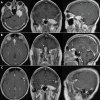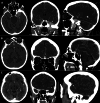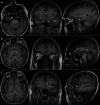Regression of Multiple Intracranial Meningiomas With Cessation of Progesterone Agonist Therapy: A Case Report
- PMID: 38371126
- PMCID: PMC10873817
- DOI: 10.7759/cureus.52479
Regression of Multiple Intracranial Meningiomas With Cessation of Progesterone Agonist Therapy: A Case Report
Abstract
In this case report, we discuss a patient who experienced spontaneous regression of multiple intracranial meningiomas that were treated conservatively for 5 years after cessation of megestrol acetate, an exogenous progestin. In addition, we discuss the previous literature describing the relationship between exogenous progesterone medications and meningioma growth. This case, along with others reported, implies that cessation of progesterone therapy, when feasible, may alter the natural history of meningioma growth and thus impact treatment decisions.
Keywords: extra-axial lesion; hormonal influence on meningioma; megestrol acetate; meningioma; progestin.
Copyright © 2024, Bailey et al.
Conflict of interest statement
The authors have declared that no competing interests exist.
Figures



References
-
- Meningiomas arising from the tuberculum sellae: with the syndrome of primary optic atrophy and bitemporal field defects combined with a normal sella turcica in a middle-aged person. Cushing H, Eisenhardt L. JAMA Ophthalmol. 1929;1:1.
-
- Estrogen and progesterone therapy and meningiomas. Hage M, Plesa O, Lemaire I, Raffin Sanson ML. Endocrinology. 2022;163 - PubMed
-
- Estrogen and progesterone receptors in meningiomas. Maiuri F, Montagnani S, Gallicchio B. Surg Neurol. 1986;26:435–440. - PubMed
-
- Growth of a meningioma in a transsexual patient after estrogen-progestin therapy. Gazzeri R, Galarza M, Gazzeri G. N Engl J Med. 2007;357:2411–2412. - PubMed
Publication types
LinkOut - more resources
Full Text Sources
